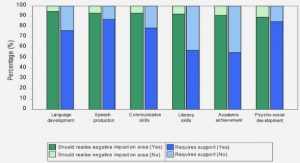Get Complete Project Material File(s) Now! »
Post-return Adjustment
According to Black et al. (1992a) the Post-return Adjustment is dependent upon four different factors; Individual variables, Job Variables, Organisational Variables and Non- work Variables. These four variables can either ease or hinder the adjustment to work, interaction and to the culture in general. In fact, all these four different variables were also found to affect the Repatriation adjustment of the expatriates within the empirical findings of this thesis. The authors of this thesis will now explain how.
Black et al.’s (1992a) model states that Individual variables important and relevant to both an effective cross-cultural adjustment and the repatriation adjustment process are self-oriented factors, relational-oriented factors, and perceptual-oriented factors. These three factors are expected to facilitate the cross-cultural adjustments during the international assignment and also to have a positive impact on the repatriation adjustment. Since the majority of expatriates interviewed did not experience problems related to the cross-cultural adjustment, the authors of this thesis suggests that one possible explanation for this might be that the interviewees had personalities fulfilling these three factors. According to research, the more expatriates acquire the rules and maps of the host culture, the more difficult it is to go back to their old maps and rules relevant to the home country.
This especially concerns expatriates that have been on assignments for extended periods or completed assignments in cultures very diverse from their home country (Black & Gregersen, 1999). This can be confirmed by the fact that the few interviewees who actually had greater problems with the process of acclimatization to home country, generally had been away for a longer perio and to countries very different from home.
Another significant issue in the adjustment process of repatriation is connected to Job variables. According to Black et al.’s (1992a) research, clear job description and high role clarity is relevant in repatriation adjustment to home company. The researchers also found that generally expatriates took their global assignment with the hope of promotion after a successful international assignment. However, this is not usually equivalent to the reality of repatriation (Black et al., 1992b). This has also been confirmed by the empirical findings in this thesis. A majority of the interviewed respondents felt that they had developed new skills, international contacts and gained new knowledge during their overseas assignment.
Consequently, they generally wanted new positions at a higher level than the ones guaranteed by Volvo CE. Also researchers imply that international assignments, in some cases, can be seen like a punishment in terms of an expatriates’ carrier since many expatriates returning home are demoted to lower-level positions than they had held overseas (O’Sullivan, 2002). In this particular case study expatriates interviewed were guaranteed a position equal to the one they had before departure. However, many of the respondents strived for a reposition related to a career development. Consequently, they often wanted positions at a higher level than before their international assignment. Thus, since Volvo CE guaranteed a position equal to the one before departure, they more or less had to find a position on their own. This could be exemplified by the quotation below:
“Since that would be like taking 10 steps back I choose to get another employment myself.” Furthermore, several of the respondents from the personal interviews stated that they were disappointed and dissatisfied with the repositioning process. Firstly, they had only some help finding new positions on return. In addition, many interviewees experienced that Volvo CE did not acknowledge their new skills or take their gained knowledge into account when repositioning them. This created a great deal of irritation and frustration.
The authors of this thesis therefore propose that there is a clear connection between Job variables and the expatriate’s adjustment to home country and perception of the repatriation process. Organisational variables, such as the home company’s overall approach to the repatriation process can have an important impact on the adjustment of expatriates that have returned. Studies show that many expatriates feel that their companies have communicated a very vague picture of the repatriation process (Paik et al., 2002; Black et al., 1992a; Feldman, 1991). This fact can also be seen in the empirical findings, mainly since several interviewees express that a repatriation process was missed. Additionally, this could also be related to Solomon’s (1995), statement suggesting that an effective international assignment process consists of a circular process. Further, the author of this thesis suggest that the picture illustrating Volvo Groups process of an international assignment expresses a somewhat similar view to the circular model suggested by Solomon (1995). Solomon (1995) argue that the international assignment consist of five different phases; selection of candidates, cross- cultural preparation, global career management, completion of the international assignment and finally the repatriation process. These different stages can be compared and also considered as equal to the six stages; Job offer, Pre-visit, Departure, Arrival, Assignment and the Repatriation, suggested by the Volvo Group and Volvo CE. Solomon (1995) further state that many organisations fail to take all different stages into consideration and consequently are unsuccessful in creating an effective international assignment. By examining the perceived experiences among expatriates, empirical findings show that a majority of current expatriates did not describe the repatriation process as being effective.
Despite the fact that information and illustrations distributed within Volvo CE did include a phase of repatriation, a majority of the interviewees still did not consider the repatriation process as represented within the different stages of an international assignment. This is proved, since many expatriates explicitly stated that there was no repatriation process experienced within Volvo CE. The authors of this thesis further propose that this also could be closely connected to the aspects of clear responsibility areas. Results from personal interviews indicated that a majority of expatriates in the beginning perceived the administration of international assignment as professional. Additionally, some expatriates interviewed stated that the HRM department in Eskilstuna took their full responsibility in relation to the time during the international assignment and the repatriation. On the other hand, personal interviews also showed that the responsibility areas in relation to the repatriation process sometimes were perceived as being indistinct. Many interviewees stated that they missed some kind of specified restrictions on what the individual responsibility concerned. One of the respondents stated this really clear by saying:
“As long as I know what my responsibilities are and if they are clearly stated in beforehand it is alright with me. I can do everything on my own, just as long as I know about it.”
1 Introduction
1.1 Problem discussion
1.2 Purpose
1.3 Introducing information & Definitions.
1.4 Structure of the thesis
2 Methodology
2.1 Qualitative method
2.2 Case study
2.3 Selection of Volvo CE and respondents from Volvo CE.
2.5 Analyzing data
2.6 Trustworthiness of the thesis
3 Theoretical Framework
3.1 Introduction
3.2 The problems with repatriation.
3.3 Factors influencing the repatriation adjustment.
3.3.1 Pre-return Repatriation Adjustment –sources of information about home country.
3.3.2 Post-return Repatriation Adjustment .
3.4 The purpose of international assignments
3.5 Effective repatriation
3.5.1 Prior to departure
3.5.2 During their stay
3.5.3 After they return .
3.6 Transaction cost
3.7 Concluding section
4 A case study of the Repatriation process of Volvo
CE in Eskilstuna
4.2 Results from the empirical findings .
4.2.1 The purpose of international assignments .
4.2.2 Clear Repatriation and Responsibility areas .
5 Analysis.
5.1 Factors affecting the repatriation process
5.1.1 The purpose of international assignments
5.2 Effective repatriation
6 Discussio
7 Conclusion
8 Final remarks
GET THE COMPLETE PROJECT
Ef fect ive Repat riat ion A case study of Volvo Construction Equipment in Eskilstuna






